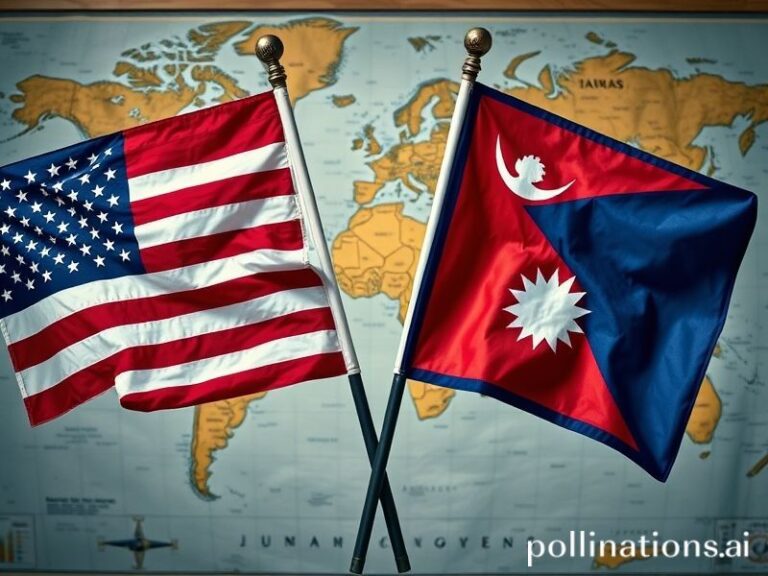TVBS News: How Taiwan’s 24-Hour Panic Merchant Became the World’s Favorite Anxiety Export
**TVBS News: Taiwan’s 24-Hour Reality Show Goes Global**
In the fluorescent-lit corridors of Taipei’s Neihu district, TVBS News has spent three decades perfecting the art of shouting “BREAKING” in Mandarin, Cantonese, and—when the typhoon really howls—English. Once a humble joint venture between Hong Kong’s TVB and local investors, the channel has mutated into Taiwan’s most exportable panic merchant, beaming island-sized anxiety to 30-odd countries and reminding the Chinese diaspora that, yes, the world is still ending, but first a word from our oyster-noodle sponsor.
To outsiders, TVBS looks like any other glowing rectangle of doom: red banners, stock-market crawl, anchors who smile the way dentists do before they mention the price. Yet its brand of hysteria is exquisitely Taiwanese—equal parts meteorological fatalism, semiconductor neurosis, and the lingering suspicion that Beijing’s next tweet could rain missiles on the night market. The formula travels surprisingly well. In Los Angeles, insomniac Uber drivers keep it on low volume between surge alerts; in Sydney, Cantonese grandparents let it babysit the grandkids, proving that nothing soothes toddlers like footage of amphibious drones.
International executives call this “soft-power arbitrage.” Translation: if you can’t sell the island, sell the adrenaline. Since 2020, TVBS has syndicated its crisis grammar—bold fonts, ominous synth, the weather lady who doubles as a military analyst—to fledgling channels in Thailand and the Czech Republic, where viewers find Taiwanese chip shortages more relatable than their own cabinet resignations. The network even licenses its alert soundtrack to a video-game studio in Montreal, ensuring that when teenagers nuke digital Taipei, they hear the same klaxon their grandparents use to time tea breaks.
The real product, of course, is uncertainty. Climate change has been a godsend: every super-typhoon is cross-branded with satellite heat maps and a live read from the latest IPCC footnote. Advertisers queue up to sponsor “Storm Mode,” knowing that fear loosens wallets faster than loyalty points ever could. When TSMC announces a 3-nanometer delay, the anchors switch to “Silicon Crisis” graphics; within minutes, Bloomberg picks up the feed and Frankfurt traders revise their recession odds. No one admits they’re gambling on the mood swings of a cable channel whose newsroom still contains a lucky shrine to Matsu, goddess of seafarers and—conveniently—semiconductors.
Beijing watches this pantomime with the disdain of a cat observing a laser pointer. Chinese state media dismiss TVBS as “a bandit broadcaster,” yet quietly mirrors its pacing: faster cuts, louder stingers, the same micro-doses of existential dread. Both sides understand that in the attention economy, nationalism is just another genre of reality TV. The difference is that TVBS must also turn a profit, which explains why its Ukraine coverage is sponsored by a Ukrainian wheat-free noodle brand—nothing says solidarity like slurping while Kyiv burns.
Western media critics praise the channel’s “citizen journalism,” a polite label for viewers who film their own living-room windows imploding during Category-5s. The clips are uploaded, watermarked, and monetized before the debris lands, creating a virtuous circle: more storms, more content, more ad inventory for storm-proof windows. Call it disaster socialism—everyone gets a share of the click revenue, minus the standard administrative typhoon.
Meanwhile, the network’s English-language YouTube clips rack up millions of views from armchair sinologists convinced that watching Taiwanese traffic accidents counts as geopolitical research. The comment sections are a联合国 of conspiracy—Indians blaming Pfizer, Brazilians quoting Sun Tzu, Americans asking if Taiwan is “like, a real country.” TVBS moderators leave the chaos untouched; engagement is engagement, and algorithms can’t tell patriotism from brain worms.
Will TVBS still matter if the strait calms, if chips cool, if humanity suddenly develops a taste for boring stability? History suggests otherwise. Somewhere, right now, a producer is storyboarding “Mega-Drought 2027,” complete with touchscreen crop failures and a sponsorship slot for desalinated bubble tea. The world will watch, horrified and vaguely hungry, because deep down we crave the narcotic of proximity—disaster safe enough to witness in slippers, foreign enough to feel abstract, priced just low enough to keep the lights on and the anxiety flowing. In the end, TVBS isn’t really covering Taiwan; it’s covering us, pixel by pixel, one manufactured gasp at a time.







